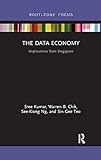The Data Economy : Implications from Singapore / by Sree Kumar, Warren B. Chik, See-Kiong Ng and Sin Gee Teo.
Material type: TextLanguage: English Series: Routledge Research in Public Administration and Public PolicyPublisher: Boca Raton, FL : Routledge, [2018]Copyright date: ©2019Edition: First editionDescription: 1 online resource (126 pages) : 18 illustrations, text file, PDFContent type:
TextLanguage: English Series: Routledge Research in Public Administration and Public PolicyPublisher: Boca Raton, FL : Routledge, [2018]Copyright date: ©2019Edition: First editionDescription: 1 online resource (126 pages) : 18 illustrations, text file, PDFContent type: - text
- computer
- online resource
- 9780429433658
- Data mining -- Economic aspects
- Big data -- Economic aspects
- Data mining -- Economic aspects -- Singapore
- Big data -- Economic aspects -- Singapore
- Urban transportation -- Singapore -- Data processing
- Urban transportation -- Data processing
- Big data
- cyber crime
- data anonymisation
- data economy
- data regulation
- NFC payment
- privacy
- public transport
- singapore
- smart cities
- 338.4/700631205957
- HB143.5
- Also available in print format.
Includes bibliographical references and index.
Foreword -- Acknowledgement -- 1.Introduction -- 2.An Outline of the Data Economy -- 3.The Search for Data -- 4.The Analysis of Data -- 5.The Legal Contours of the Data Economy -- 6.Redefining the Data Economy -- 7.Implications for the Future -- Selected Bibliography -- Index
"The data economy" is a term used by many, but properly understood by few. Even more so the concept of "big data". Both terms embody the notion of a digital world in which many transactions and data flows animate a virtual space. This is the unseen world in which technology has become the master, with the hand of the human less visible. In fact, however, it is human interaction in and around technology that makes data so pervasive and important – the ability of the human mind to extract, manipulate and shape data that gives meaning to it. This book outlines the findings and conclusions of a multidisciplinary team of data scientists, lawyers, and economists tasked with studying both the possibilities of exploiting the rich data sets made available from many human–technology interactions and the practical and legal limitationsof trying to do so. It revolves around a core case study of Singapore’s public transport system, using data from both the private company operating the contactless payment system (EZ-Link) and the government agency responsible for public transport infrastructure (Land Transport Authority) In analysing both the possibilities and the limitations of these data sets, the authors propose policy recommendations in terms of both the usesof large data sets and the legislation necessary to enable these uses while protecting the privacy of users.
Also available in print format.
There are no comments on this title.
